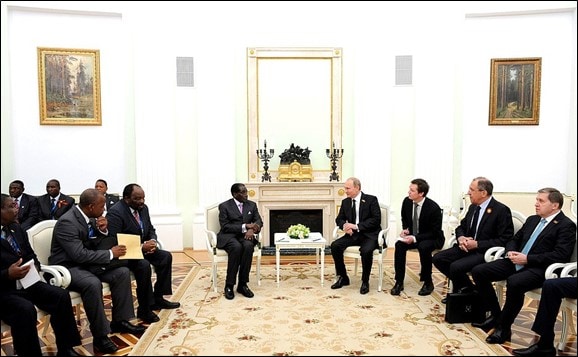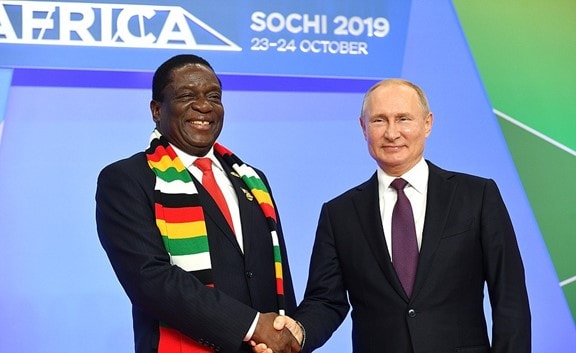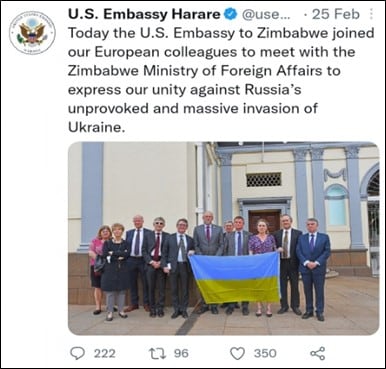Introduction
On March 2, 2022, the United Nations General Assembly (UNGA) passed a resolution condemning Russia's invasion of Ukraine. Zimbabwe was among the African countries to abstain from the vote.[1] It is worth noting that Moscow helped Zimbabwe during its anti-colonialist struggle.
Commenting on Russia-Zimbabwe relations, the South African Institute of International Affairs wrote: "Support was given to the National Democratic Party founded by Joshua Nkomo, of which Robert Mugabe[2] was initially a member. When the party was banned by the Rhodesian regime,[3] the Soviet Union provided Nkomo and his new Zimbabwe African People's Union with arms, training by Soviet military advisers and other military support. Mugabe was the leader of the Zimbabwe African National Union (ZANU), which was not backed by the Soviets. As a result, he looked to China for support. The diplomatic relationship between Russia and Zimbabwe was established 10 only months after independence, on 18 February 1981, while the diplomatic relationship with China was established on the day of independence.
"In 2003 Harare announced its 'Look East' Policy in the face of economic sanctions by the West. It aimed to expand bilateral and trade relations with mainly China, but also Malaysia, Singapore, Vietnam, Japan, South Korea, India and Russia. In 2005, during a G8 meeting, Russian President Vladimir Putin stated: 'We should not be afraid to stop support for the dictators, such as the leader of Zimbabwe – Mugabe.' In 2008, as a result of widespread violence during the presidential elections in Zimbabwe, the UN Security Council initiated a resolution to impose an arms embargo and sanctions on Mugabe and his allies. Russia and China vetoed the resolution. Yet even this move did not warm up the frosty relationship between Russia and Zimbabwe... However, Russian interest in Africa changed in 2014 [with the annexation of Crimea], when it faced Western sanctions and needed new markets...
"Putin has tried to use African countries' historical relationships with the Soviet Union and the support provided to anti-colonial movements as an entry point to promote Russia's economic agenda over that of Western countries with an active presence on the continent. The narrative is that Western countries are colonizers that exploit African nations under the pretext of promoting democracy, while the West's stringent conditions on cooperation and trade are used to extend this neo-colonial power. At the Russia–Africa Summit, Putin characterized the proposed cooperation between the two parties as 'no strings attached', meaning that financing need not follow the liberal principles of transparency and accountability."[4]
In 2019, Zimbabwe's President Emmerson Mnangagwa said of relations with Russia: "We feel very free to trade with the Russian Federation, than with any other Western country that colonized us... This is evidence from the past relation, no strings at all. This is in fact mutual trade, mutual relationship and mutual cooperation."[5]
In 2015, former Zimbabwean President Robert Mugabe was invited to Moscow to take part in celebrating the 70th anniversary of Russia's victory in the Great Patriotic War, the Russian term for the Eastern Front in World War II. On that occasion Mugabe said: "The victory over Nazism and fascism was our shared victory. Military units from Africa also took part in the war. Sadly, the soldiers who fought first Nazism and fascism and then Japanese militarism alongside the Soviet Union went on to become Africa's oppressors. The fact is that although they fought Nazism and fascism, they had not stopped being colonizers.
"We later had to lead our own fight against British imperialism and against the Apartheid system in South Africa. We needed support to reach our goals, and the support we received from the Soviet Union and China made a big contribution to helping us achieve our liberation. When our country celebrated its independence in 1980, we paid tribute to the support of the Soviet Union and China, who helped us in our liberation.
"The Soviet Union broke up, it is true, but Russia has continued. Russia, which was the core of the Soviet Union, has stood firm against the pressure from the United States and Europe, which have imposed sanctions on your country. We in our time also fought British imperialism and we had to take our land back from the British farmers. When we were successful in this effort, the United States, Europe and Britain imposed sanctions on us.
"You are fighting sanctions now, and so are we. The United States forms the summit of this imperialist pyramid, followed by Europe. For this reason, we must work together, and this made it all the greater a pleasure to watch the events yesterday, as they demonstrated Russia's revival."[6]

Russian President Vladimir Putin with President of Zimbabwe Robert Mugabe. (Source: Kremlin.ru)
Zimbabwean Media's Reactions To Russia's Invasion Of Ukraine
In the aftermath of the vote against Russia at the UNGA, Zimbabwean media outlets commented on Zimbabwe's stance and the West's political position. On March 16, 2022, the Zimbabwean media outlet The Herald published an article accusing the U.S. Embassy in Harare to take a photo with the Ukrainian flag in front of Zimbabwe's Ministry of Foreign Affairs building. According to The Herald, the U.S. did not respect Zimbabwe's choice to remain neutral. "Zimbabwe's foreign policy is that the country is a friend to all and an enemy to none," the media outlet stated. It then added "[The Western countries] wanted [Zimbabwe] to stand with them against Russia, with whom Zimbabwe nurses no grudges. Zimbabwe is no war monger like the West."
The Herald also accused the U.S. of double standards and of not respecting Zimbabwe's sovereignty. It added that the U.S. cannot ask Zimbabwe to take its side, after putting the country under sanctions. "As the Russia-Ukraine conflict continues, it is easy for the world to be swayed against Russia by the likes of the US' propaganda, but as the latter points an accusatory finger at Moscow, it should be remembered that three bloodied fingers are pointing back at it literally and metaphorically confirming its guilt."
The Herald then added that only the "politically naive Zelenskys of this world" can expect the West to give a sincere and genuine support. [7]
On March 5, 2022, the Zimbabwean media outlet The Standard published an article by Prof. Arthur G.O. Mutambara, who served as Deputy Prime Minister of Zimbabwe from 2009 to 2013, criticizing the blocking of Russian TV channel RT in Africa by MultiChoice, a company headquartered in South African that operates DStv, a major satellite television service in Sub-Saharan Africa. "White people who own this conglomerate are deciding what information is available to Africans across the continent... If we do not control what information we have access to, what else do not we control?" Mutambara wrote.[8]

Russian President Vladimir Putin with President of Zimbabwe Emmerson Dambudzo Mnangagwa at the 2019 Russia-Africa Summit, which took place in Sochi. (Source: Kremlin.ru)
Below are the two articles:
The Herald: "Zimbabwe Is No War Monger Like The West"
"On the last Friday of last month [February 25, 2022], a delegation of U.S. Embassy in Zimbabwe personnel and its European Union (EU) counterparts made a beeline for Munhumutapa Building in Harare to the Ministry of Foreign Affairs and International Trade offices.
"Their business? To mouth their support for Ukraine in the ongoing Russia-Ukraine conflict.
"After the deed, the coterie paraded itself outside the building holding a Ukrainian flag for a photoshoot. The U.S. Embassy then gleefully and childishly tweeted the event in a self-congratulatory tone that night. 'Today, the U.S. Embassy to Zimbabwe joined our European colleagues to meet with the Zimbabwe Ministry of Foreign Affairs to express our unity against Russia's unprovoked and massive invasion of Ukraine,' the embassy said on its Twitter handle.
SUPPORT OUR WORK


(Source: Twitter.com/usembassyharare, February 25, 2022)
"It is interesting to note that the EU and US Embassies chose to knock on the door of Foreign Affairs Minister, Ambassador Frederick Shava, to express their support for Ukraine when the whole world knows that Zimbabwe's foreign policy is that the country is a friend to all and an enemy to none.
"The world knows that Zimbabwe engages and relates with other countries on the basis of mutual respect. There was no point expressing their partiality in the conflict to Zimbabwe which had never expressed any opinion... On the second of this month, Zimbabwe, together with more than 30 other countries that included China and South Africa abstained from the anti-Russia vote at an emergency session called by the United Nations Security Council (UNSC). The West and its local proxies were obviously not happy with Zimbabwe's stance. They wanted the country to stand with them against Russia, with whom Zimbabwe nurses no grudges. Zimbabwe is no war monger like the West. She clearly explained that she supported dialogue.
"In a display of their double standards, Western countries wanted a country, whose innocent people they have condemned to over 20 years of sanctions-induced poverty, to take sides with their tormentors. Many times, the EU, UK and US Embassies meddle in Zimbabwe's internal affairs without respecting their host's Ministry of Foreign Affairs. Suddenly, they remembered that there was a Ministry of Foreign Affairs to which they should go when they have issues. But when it suits them, they take to social media, meddling in the country's affairs. They shamelessly play the role of the opposition's political commissar in contravention of United Nations (UN) principle of non-interference. When they think that they can make political mileage in pursuit of their home countries' narrow and selfish objectives, they play good envoys by visiting Minister Shava. The event exposed the double standards exhibited by Western diplomats accredited to Zimbabwe...
"As the Russia-Ukraine conflict continues, it is easy for the world to be swayed against Russia by the likes of the US' propaganda, but as the latter points an accusatory finger at Moscow, it should be remembered that three bloodied fingers are pointing back at it literally and metaphorically confirming its guilt. This indicates that the US cannot claim a higher moral ground to lecture other countries...
"When the former South African President, the late Nelson Mandela, was released from Prison in 1990, and went on to become that country's President in 1994, some people in his country and elsewhere in Africa accused him of having sold out to the West. One thing is, however, very clear about him. Despite being feted by global leaders in Western capitals, he was not blinded to their evil nature. In a video clip doing rounds on various social media platforms, Mandela is heard articulating the US' evil nature. 'If there is a country that has committed unspeakable atrocities in the world, it is the United States. They don't care about human beings. Fifty-seven years ago, when Japan was retreating on all fronts, they decided to drop an atomic bomb on Hiroshima and Nagasaki — killed a lot of innocent people, (and some) are still suffering the effects of those bombs. Those bombs were not aimed against the Japanese. They were aimed against the Soviet Union to say 'look, this is the power that we have,'' Mandela said. [9]
"As Mandela implied, the US does not care about the effects of its actions on any global citizen. It only cares about its own selfish objectives and narrow interests. It is against this background that the world should digest the ongoing Russo-Ukrainian conflict and NATO members' overtures. Only the politically naive Zelenskys of this world would expect sincere and genuine support from the U.S. and other Western countries..."
Zimbabwe's Former Deputy Prime Minister Mutambara: 'Multichoice (DStv) Has Just Shut Down RT Across Africa... Very Sad And Shameful, Indeed'

Prof. Arthur G.O. Mutambara (Source: Newsday.co.zw)
"Multichoice (DStv) has just shut down RT (Russian Today) Channel across Africa because of the invasion of Ukraine.
"It is the company's view that Africans must not listen to anything balanced or sympathetic to Russia.
"Very sad and shameful, indeed.
"MultiChoice is an 'African' company switching off the entire continent from accessing balanced information about a war that has nothing to do with Africa.
"White people who own this conglomerate are deciding what information is available to Africans across the continent.
"If there was any need to demonstrate our lack of agency and control on the continent, this is it.
"If we do not control what information we have access to, what else do not we control?
"If one white company on the continent can shut down access across the continent, what does that say of us Africans?
"White people who own an 'African' company, MultiChoice, have more influence than all the African governments put together.
"Can we not set up an African company that we control as black people in the media space?
"Given our 55 governments and our many black billionaires?
"Why are we being totally undermined by one white company in our continent?
"Some have argued that it is not MultiChoice's fault. 'Under Western against Russia, the European distributor cut the RT supply to MultiChoice,' they have averred.
"Well, who owns the European company that distributes RT to MultiChoice?
"Why, as an entire continent, are we dependent on this European company?
"Why can we not as Africans have our own global media distributors and our own satellites?
"Who owns MultiChoice anyway?
"Can anyone vouch for the African-centeredness of MultiChoice's owners and investors?
"Why is the entire continent leaving its media fortunes in the hands of this one company – MultiChoice
"Then we come to the vote at the UN.
"So much for African Unity!!!
"Could we not caucus and come up with a common position before voting?
"Whatever the position (for, against, abstain, or being out of the room)!
"We should have taken the same position on this European War.
"If we cannot agree on this invasion as Africans, what else can we agree on?
"If we are not in total agreement, why not at least 80% of us go one way?
"We have work to do on the continent."
[1] See MEMRI Special Dispatch No. 9850, African Continent's Reactions To Russia's Invasion Of Ukraine – Part I – South Africa's Head Of Public Diplomacy: 'Just As Russia Will Not Tolerate NATO Positioning Missiles Near Its Territory, The U.S. Would Never Tolerate Russia Deploying Missiles In Its Neighborhood,' March 24, 2022, MEMRI Special Dispatch No. 9854, African Continent's Reactions To Russia's Invasion Of Ukraine – Part II – Former Nigerian Minister: 'I Blame Zelensky And His Western Allies And Friends For This Unfolding Tragedy,' March 25, 2022.
[2] Robert Mugabe was prime minister of Zimbabwe from 1980 to 1987 and then its president from 1987 to 2017. Britannica.com/biography/Robert-Mugabe, accessed March 28, 2022.
[3] Rhodesia was the name used by the former Southern Rhodesia, first as a British colony (1964–65), then as a self-declared independent country without international recognition (1965–79). Britannica.com/place/Rhodesia, accessed March 28, 2022.
[4] Media.africaportal.org/documents/Special-Report-kachur-002.pdf, November 2020.
[5] Media.africaportal.org/documents/Special-Report-kachur-002.pdf, November 2020.
[6] En.kremlin.ru/events/president/news/49451, May 10, 2015.
[7] Herald.co.zw/russia-ukraine-tiff-exposes-hypocrisy-of-us-west/, March 16, 2022. The article was penned by Nobleman Runyanga.
[8] Thestandard.newsday.co.zw/2022/03/05/on-the-african-vote-at-the-un-the-blocking-of-russia-today-the-lessons/, March 5, 2022.
[9] Db.nelsonmandela.org/speeches/pub_view.asp?pg=item&ItemID=NMS994, January 30, 2003.




